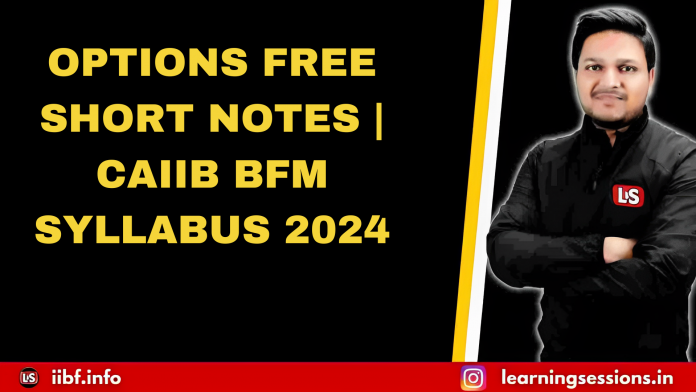OPTIONS FREE SHORT NOTES | CAIIB BFM SYLLABUS 2023
An option is a right to an investor, either to buy or sell a stock at a predetermined price at a future date.
There are two types of options in the market: Put & Call
Put: Input option, it is estimated that the price of the stock will fall.
Call: Incall option, it is estimated that the price of the stock value will rise.
And because options have shares as an underlying asset of the options, these stock options are a form of equity derivative and also sometimes called equity options.
MEANING OF STOCK OPTIONS
These are one the types of derivatives (financial instruments). As the name suggests, derivatives drive their worth from the value of an underlying asset or security. When we talk about stock options, that underlying asset is the shares of a company’s capital.
Basically, an option is a contract between two parties either to buy or sell the stock at the given transaction date as well as at the price which is pre-fixed irrespective of the market price that will prevail on the fixed future date (transaction date).
When an options contract is written, the contract determines a price that the underlying stock must reach to be ‘ in the money’ referred to as the strike price.
The value of the option is determined by the difference between the price of the underlying stock and the strike price i.e. Exercise price.
CATEGORIES OF STOCK OPTIONS:-
Call option: This option allows the option holder to buy the underlying asset at a predetermined price within a specified time.
Put option: This option allows the option holder to sell the underlying asset at a predetermined price within specified time.
Related Links:-
OPTION STYLES
Two different styles of options are available in the market i.e. American option and the European option.
The American options are the ones which can be exercised at any time starting from the purchase date should be expiration date.
The European options are the ones which can only be exercised at the expiration date and they are less popular.
EXPIRATION DATE
Options have allowed a trader to not only bet on a stock rising or falling but also has allowed him to select a specific date as to when he or she expects the stock to fall or rise which is popularly known as the expiration date. This date is important for it has 17 days to determine the value of the put or call (time value).
STRIKE PRICE
It is a price that determines whether or not the option will be exercised. A trader expects the price of the stock either to be above or below by the time of its expiration.
If a trader expects that the stock price of IBM will rise in the future, he or she can buy a call for a specific month at a specific price.
CONTRACT SIZE
The size of the contract represents a certain number of underlying shares that a trader might be looking to buy. For example, One contract could be equal to 100 shares of the underlying stock.
PREMIUM
The price of the option is premium. Premium is determined by taking the price of the call and then multiplying it by the number of contracts that are bought under the option.
TRADING STOCK OPTIONS
A trader can sell options based on his or her strategy. If a trader thinks that his or her shares might rise, they can buy the call or they can also choose to right or sell the put.
WHY WOULD ONE BUY (TRADE) AN OPTION?
An option let an investor play on the rise or the fall of the underlying stock by a specific date in the future and this lets the large corporations or institutes hedge against risk exposure to given security while at the same time options also let the investors speculate on the prices of stocks, which typically leads to increase in their risk.
HOW DO STOCK OPTIONS WORK?
Suppose at present, the value of stock Z is Rs.100. An investor ‘Farooq’ buys a call option at the strike price of Rs.500. Rs.500 is the price which the stock must rise above for him to make a profit.
And if at the expiration date, the stock rises to Rs.700, then the call option would be valued at Rs.200 because stock Z is higher than the strike price of Rs.500 by Rs.200.
In case if Farooq would have bought a put option instead of a call option and if the underlying stock was to fall, only then Farooq would have profited from the option.
HOW A STOCK OPTION IS EXERCISED?
Exercising stock options involve selling (put) or buying (call) the underlying asset at the strike price. Stock options are most often traded before the expiration dates when the options are deeply ‘in the money with the Delta close to 100 or at the expiration date if it is ‘in the money at any amount.
When an option gets exercised, it disappears while the underlying asset gets delivered and the strike price.
Options have provided the traders the right to buy or sell shares of a certain stock at an agreed price at a future date. This option is not an obligation on part of the trader but a right. Options are one form of equity derivatives and can be categorized into 2 types: calls & puts. There are different uses of trading in options such as Hedging, speculation & simple trading. One can use the derivative market as per their own accord.
Also Like:





